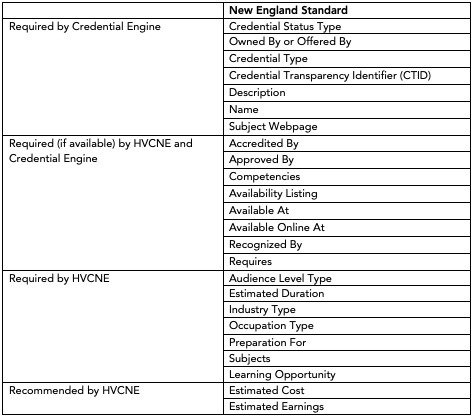The minimum data policy represents the fields that will make up credential profiles in the Credential Registry. The minimum data policy will allow credential seekers, employers and counselors, for example, to compare credentials and understand connections between credentials. To view a credential with a similar profile to those that will be published through High Value Credentials for New England, click here.

Definitions
Required by Credential Engine
Credential Status Type: Type of official status of the credential; select from an enumeration of such types – active, deprecated, probationary, superseded.
Owned By or Offered By: The organization that owns and/or offers the credential. Agent includes credentialing organizations, quality assurance organizations and persons. It does not include credential holders.
Credential Type: The type of credential being described, including, but not limited to, certificate, certification, degree, and badge.
Credential Transparency Identifier (DTID): Globally unique Credential Transparency Identifier (CTID) by which the creator, owner or provider of a credential, learning opportunity competency, or assessment recognizes the entity in transactions with the external environment (e.g., in verifiable claims involving a credential).
Description: A short description of the resource being described.
Name: The name of the resource being described.
Subject Webpage: The webpage that describes this entity.
Required (if available) by HVCNE and Credential Engine
Accredited By: Quality assurance organization that provides official authorization to, or approval of, a credential, organization, assessment, or learning opportunity.
Approved By: Organization that pronounces favorable judgment for this credential, assessment, learning opportunity, or organization.
Competencies: Description of measurable or observable knowledge, skills, and abilities necessary to successful performance of a person in a given context. Competency is broadly defined to include assertions of academic, professional, occupational, vocational and life goals, outcomes, and standards, however labeled.
Availability Listing: Listing of online and/or physical locations where a credential can be pursued.
Available At: Physical location where the credential, assessment, or learning opportunity can be pursued.
Available Online At: Online location where the credential, assessment, or learning opportunity can be pursued.
Recognized By: Agent that acknowledges the validity of the credential, learning opportunity or assessment.
Requires: Requirement or set of requirements for this credential, learning opportunity, or assessment.
Required by HVCNE
Audience Level Type: Type of level indicating a point in a progression through an educational or training context, for which the credential is intended; select from an existing enumeration of such types – advanced, associate’s degree, bachelor’s degree, beginner, doctoral, intermediate, master’s degree, postsecondary, secondary.
Estimated Duration: Estimated time it will take to complete a credential, learning opportunity or assessment.
Industry Type: Type of industry: Select from an existing enumeration of such types such as the SIC, NAICS, and ISIC classifications. Best practice in identifying industries for U.S. credentials is to provide the NAICS code using the ceterms:naics property.
Occupation Type: Type of occupation; select from an existing enumeration of such types. For U.S. credentials, best practice is to identify an occupation using a framework such as the O*Net.
Preparation for (“Connections”): Another credential, learning opportunity or assessment that provides preparation for this credential, learning opportunity or assessment.
Subjects: Words or brief phrases describing the topicality of the entity; select subject terms from an existing enumeration of such terms.
Learning Opportunity: Learning opportunity that is the focus of a condition, process or another learning opportunity, such as an internship, practicum, co-op, capstone project, etc.
Recommended by HVCNE
Estimated Cost: Estimated cost of a credential, learning opportunity or assessment.
Earnings: Entity describing aggregate credential holder earnings data.
